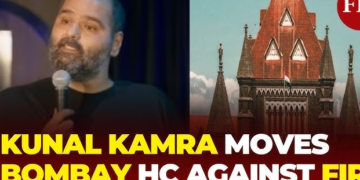Mumbai, April 8 — Stand-up comedian Kunal Kamra has approached the Bombay High Court seeking the quashing of a First Information Report (FIR) lodged against him over a controversial remark made during one of his recent performances. The FIR, registered at Khar Police Station on March 24, accuses Kamra of defamation and promoting enmity after he referred to Maharashtra Deputy Chief Minister Eknath Shinde as a “gaddar” (traitor).
The complaint was filed by Shiv Sena MLA Murji Patel, who took objection to Kamra’s comments during a parody performance in which the comedian reportedly mocked the political defection led by Shinde that toppled the previous Maharashtra government in 2022. Patel claimed that Kamra’s statements were intended to malign Shinde’s image and incite public unrest.
In his petition, Kamra has challenged the legality and propriety of the FIR, arguing that the remarks made were part of a satirical act and fall squarely within the boundaries of artistic expression and free speech. His legal team has stated that the FIR is an infringement on his constitutional rights under Article 19(1)(a), which guarantees the freedom of speech and expression.
“The complaint is politically motivated and an attempt to suppress dissent through intimidation,” said a source close to Kamra. “The statements made during a comedic set, meant to provoke thought through satire, cannot be equated with criminal intent.”
Kamra has previously been vocal in his criticism of various political figures and has faced legal challenges in the past for his outspoken views. His latest plea underscores the growing tension between freedom of expression and political sensitivities in India.
The Bombay High Court is expected to hear Kamra’s petition today. Legal experts believe that the case could have significant implications for comedians and satirists across the country, especially in light of increasing scrutiny over artistic content.
As the matter proceeds, all eyes will be on how the judiciary navigates the delicate balance between maintaining public order and upholding the right to free expression in a democratic society.















 Categories
Categories









